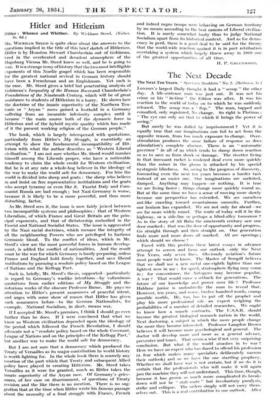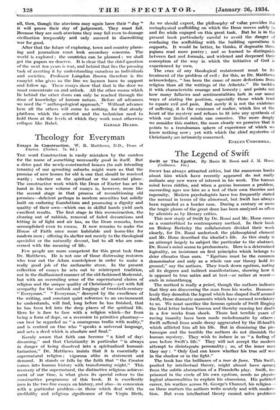The Next Decade
The Next Ten Years. " Spectator Booklets " No. 2. (Methuen. ls.)
loM3ors's largest Daily thought it had a " scoop " the other day. A life-sentence man was just out. It was not his crime or his " in-time " the Editor was after. It was his reaction to the world of today on to which he was suddenly released. The scoop was a flop." The man, tapped and
consulted, only registered, No change. So right is Plotinus : " The eye can only sec that to which it brings the power of seeing."
But surely he was dulled by imprisOnment ? Yet it is equally true that our imaginations can fail to act from the opposite reason, from too much exposure to change. Over- stimulation produces the same failure of response as does stimulation's complete absence. There is an " automatic
governor " in all of us which tends to damp down reaction so as to save us from shock or damage. The rivetter living in that incessant racket is rendered deaf even more quickly than the miner in the gloom is attacked by his special nystagmic blindness. So, owing to the progress of discovery, forecasting even the next ten years becomes a harder task instead of an easier one. Our imaginations are surfeited, damped. Anything may happen—or nothing. It is true we are living faster : things change more quickly round us. But at the same time we have a sense of moving more slowly because our perspective has extended. We see ourselves ant-like crawling toward mountainous summits. Further, our horizon has expanded. We see not only far ahead—we sec far more widely round. The route of today will it be the highway, or a side-line or perhaps a blind-alley tomorrow ? As in the story of All Baba the nineteenth century saw one door marked ; that was the door of opportunity and progress. Go straight through and then straight on. Our generation finds more and more doors all marked. All are openings ; which should we choose ?
Faced with this problem these latest essays in advance attempt to screen and focus our outlook—only the Next Ten Years, only seven lines. Obviously aviation's future most people want to know. The Master of Sempill believes that we shall use a new metal one-eighth lighter than our lightest now in use : for speed, stratosphere flying may come in ; for convenience, the Autogyro may become popular. A war ? That would cause a setback for generations. The future of our knowledge and power over life ? Professor Haldane junior is undoubtedly the man to reveal that. However, ten years, and worse, twelve hundred words, cramp possible worlds. Ile, too, has to put off the prophet and play his more professional role---an expert weighing the probabilities of a number of detailed. researches. We ought to know how a muscle contracts. The U.S.S.R. should become the greatest biological research nation in the world. Next doctoring, a subject in which the more people change the more they become interested. Professor Langdon Brown believes it will become more psychological and general. The doctor will develop more and more as a general adviser, preventer and toner. That seems a wise if not very surprising conclusion. But what if the world smashes into to war ? Here we have an expert who has dared to offend his profession (a fear which makes many specialists deliberately narrow their outlook) and so we have the one startling prophecy. Whether we shall have war is not certain, but if we do it is certain that the professionals who will make it will again jam the machine they will not understand. This time, though, because it has grown so much more complicated its brealc dOwn will not be " stale-mate " but involuntary paralysis, strike and collapse. The orders simply will not carry them- selves out. This is a real contributIon to our outlook. Aftei all, then, though the atavisms may again have their " day " it will prove their day of judgement. They must fail. Because they are such atavisms they may fail even to damage civilization irreparably and only succeed in discrediting war for good.
After that the future of exploring, town and country plann- ing and journalism must look secondary concerns. The world is explored : the countries can be planned : we shalt get the papers we deserve. It is clear that the chief question of the next ten years is war, and behind that lies the pressing task of averting it by understanding ourselves as individuals and societies. Professor Langdon Brown therefore is the essayist who gives us the line we laymen have to support and follow up. These essays show that that is the door we must concentrate on and unlock. All the other rooms which lie behind the other doors can only be reached through the door of knowledge of human nature. Before all advances we need the •" anthropological approach." Without advance here all the others will come to nothing, for that steady platform which the scientist and the technician need to hold them at-the levels at which they -work must otherwise collapse like Babel.
GERALD HEARD.











































 Previous page
Previous page